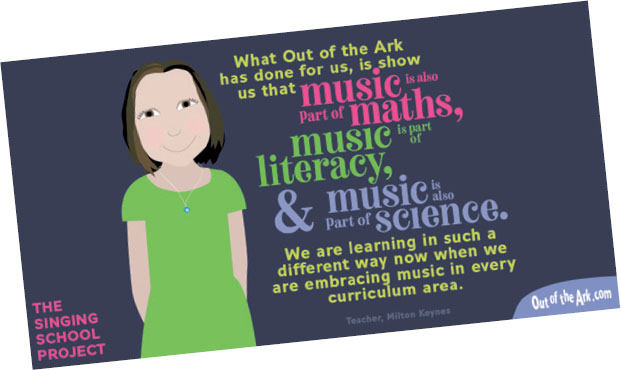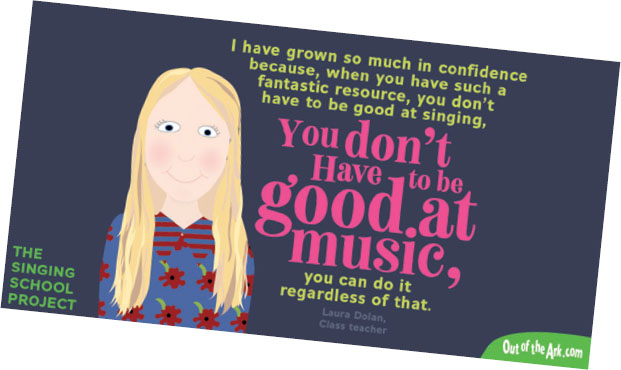
The aim was simple – to measure the impact that fully integrating singing into the school curriculum could have on a range of measures, including well-being, social inclusion, pupil and teacher confidence, as well as academic attainment across general subjects and the music curriculum.
The Singing School Research Project involved 24 Primary schools all with different backgrounds and differing existing musical engagement. 300 staff and 8,632 pupils took part in the project and all schools were asked to sing regularly as a whole school community.
As a music teacher, I was thrilled to read about this project, and it affirmed in me the importance of singing. In my own work with primary schools I see first-hand the power of singing and the positive experience for the students. First, let me take you through the project in a little more detail.

How did it start?
The project began with training, and schools were provided with resources including songs, posters, stickers, and booklets. Schools participating in the research were given unlimited access to the full Out of the Ark Music catalogue, which includes songs, backing tracks, teacher tips and activities. During the course of a single term, over 1,300 songs were used alongside 562 different activities/teacher notes.
It is important to stress the importance of good resources and a solid foundation of songs and activities. Out of the Ark Music is well known for its resources and it strikes me that it was pivotal to the success of this project. I personally use its songbooks in my teaching, and I think that they are brilliant. The songs come with activities and suggestions and I find that they just work with students. The songbooks are well worth a look if you are searching for new ideas for class and whole-school singing.
Outcomes
As I am sure you can imagine, the results of this project were hugely positive and there are some wonderful statistics that I would like to share with you. It is one thing to suggest that singing is good for a school, but it is quite another to prove it. Over the course of the term, teachers reported:
- A 10% increase in student self-esteem, confidence, and getting on with others.
- A 10% increase in phonics and listening skills, reading fluency, and spatial skills.
- An 11.3% increase in performance in maths.
But it isn't just about the students, and there are some wonderful statistics regarding the teaching staff involved. Teachers gave responses at the beginning and the end of the project and the results show that all teachers increased in:
- Confidence about teaching music to their class.
- Enjoyment of teaching music.
- Confidence about teaching singing to their class.
- Confidence in teaching music using singing.
Routines
A lot of teachers involved in this research trial commented on how effective singing was at helping with daily routines. Songs were used to help signal routines and different parts of the lesson. Singing made tidying-up more fun and also helped to change the mood and settle a class down. It was noted in the research that in many of the schools involved, the songs had become embedded and familiar such that backing tracks and lyrics were no longer needed.
Well-being and music
One thing this report proved is that staff and student well-being is positively impacted by music and daily singing. Often, the most daunting part faced by staff is singing in front of a class, but even this became positive for so many involved. The message is clear – it is possible to teach music and singing in primary school even if you are not a specialist music teacher. What I love about this project is that not only did it positively impact the students, but also the staff. Laura Dolan, a class teacher involved in the project says:
‘I have grown so much in confidence because, when you have such a fantastic resource, you don't have to be good at singing, you don't have to be good at music, you can do it regardless of that.’
Another teacher adds:
‘Out of the Ark, for me, has been an amazing experience. It's made me feel so positive about music and singing in the classroom and beyond as well.’
The student response has been overwhelmingly positive, with a Key Stage 2 student saying that, ‘it helps us with our learning because it has a song to do with every subject that we learn’. Another student in Key Stage 1 says, ‘I do singing all the time now. In our school, everyone sings’.
Conclusion

Research of this nature is not only necessary, but also really exciting to read. There is a desperate need for singing to exist in schools and this report provides tangible evidence of its impact. If schools can start to implement some of this practice, then it is likely that results will improve, and students will benefit in so many additional ways. It is also clear that staff will reap the rewards, and this is something that I particularly want to stress. As a music teacher, I benefit every day from the joy of making music with students. I believe, and this research confirms, that every teacher can gain the same benefits from music-making regardless of their musical expertise. I would encourage every music teacher to share this research with local schools and I hope that this kind of work can continue in schools up and down the country. If we can improve results, well-being and school life through music and singing then I think that is a good thing – I'm personally very grateful to all involved for their work with this project and I hope that more schools put music at the centre of their curriculums.
This has just been a brief introduction to the project, but I hope that it is has encouraged you to find out more. There is a wonderful colourful summary of the report available online at the link below, as well as a more detailed report by Susan Hallam, who is emerita professor of education and music psychology at the UCL Institute of Education. I also enjoyed watching the videos available as they show first-hand the experience of the students involved in the project.
If you haven't already, do check out some of the resources from Out of the Ark Music, which includes songbooks, musicals and other activities.




